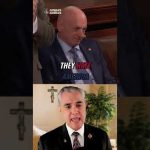Christopher Wray at his confirmation hearing on July 12, 2017. / Credit: Alex Wong/Getty Images
Washington, D.C. Newsroom, Feb 2, 2024 / 15:00 pm (CNA).
More than a dozen senators are demanding that the Federal Bureau of Investigation (FBI) come clean about its efforts to surveil traditionalist Catholics, with the lawmakers accusing the agency of deleting records, withholding details, and giving misleading information about those undertakings.
Iowa Sen. Chuck Grassley and 15 other Republican senators expressed their demands in a Jan. 31 letter to FBI Director Christopher Wray. The letter requested that the FBI provide intact records to the Senate, explain why the bureau allegedly “permanently deleted” files related to an anti-Catholic memo in the bureau’s Richmond field office, and clear up perceived contradictions between Wray’s testimonies to Congress and newly revealed information of the FBI’s surveillance of Catholics.
The letter references in part information obtained through a Dec. 4, 2023, House Judiciary Committee report on a controversial memo out of the Richmond office last year. That memo alleged a link between so-called “radical traditionalist Catholics” and “the far-right white nationalist movement.”
The memo also suggested “trip wire or source development” within parishes that offer the Traditional Latin Mass as well as within traditionalist Catholic online communities.
Citing the Dec. 4 report, the senators in their letter this week pressed Wray on why he testified that the memo was “a single product by a single field office” when new information has indicated that other field offices provided input and “another product was drafted on the same topic for external distribution.” The Dec. 4 report found plans to develop an FBI-wide memo that would have been based on the Richmond document.
“The fact an FBI office produced even one discriminatory document like this — let alone two — is deeply troubling,” Grassley said in a statement on Thursday.
“It’s unfathomable the agency’s response has been to cut corners, dodge questions, and stiff-arm Congress,” he said. “From where I’m sitting, it seems like the FBI is working to sweep the issue under the rug rather than address it.”
The senators’ letter further stated that Congress did not receive all of the information it requested because the FBI allegedly “deleted the records as soon as the incident became public.” The senators instructed the agency to “provide an immediate explanation for its order to delete records related to this incident.”
According to the senators, the deletion of files “not only obstructs congressional oversight but also means the FBI’s internal review itself did not have access to documents that may have provided critical information on the incident.”
“Why did the FBI permanently delete files related to the Richmond internal memo rather than simply removing the memo from distribution, and does [the] FBI have a backup of this information?” the letter said. “Was this deletion of records in accordance with FBI policy and federal document retention laws?”
The lawmakers in their letter also questioned the veracity of the internal review conducted by the FBI regarding the controversy. They argued that a complete investigation would require a consideration of the prior work products of employees involved in the memo, an understanding of the dissemination of the memo, a review of similar intelligence products, an investigation of the Counterterrorism Division’s review of the proposed external document, and disciplinary recommendations.
“Shockingly, none of these steps appear to have been part of the FBI’s internal review,” the senators noted.
“These revelations undermine confidence in the FBI’s response to the Richmond memo, and the bureau needs to right these wrongs,” the senators added. “Only a commitment to excellence and unbiased enforcement of the law will repair the FBI’s damaged credibility.”
The senators asked Wray to respond to the requests in the letter no later than Feb. 14 “so that Congress may continue to exercise its constitutionally-grounded oversight of the FBI’s handling of this matter.”
The FBI, meanwhile, said in a statement to CNA on Friday that “any characterization that the FBI is targeting Catholics is false.”
“As the FBI has stated many times, the intelligence product did not meet our exacting standards and was quickly removed from FBI systems,” the bureau said. “The Director was accurate when he testified that the intelligence product was produced by one field office and that the authors included a couple of sentences referring to cases from other offices.”
“An internal review conducted by the FBI found no malicious intent to target Catholics or members of any other religious faith, and did not identify any investigative steps taken as a result of the product,” the statement continued, with the bureau adding that it “[does] not conduct investigations based solely on First Amendment protected activity, including religious practices.”
This story was updated on Feb. 2 at 3:20 p.m. ET with a statement from the FBI.















